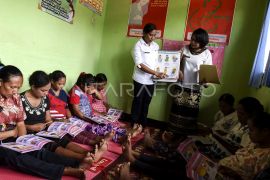Extreme poverty in Bengkulu is not high. More families are at risk of giving birth to stunted children than (being in) extreme povertyBengkulu (ANTARA) - Head of the National Population and Family Planning Agency (BKKBN) Hasto Wardoyo is targeting to bring down stunting prevalence in Bengkulu province to 12.5 percent by 2024.
Stunting prevalence in Bengkulu province is still very high at 22.1 percent, Wardoyo noted here on Thursday.
The interventions that will be taken to reduce the stunting prevalence in Bengkulu will include the prevention of marriage and childbirth during adolescence.
Related news: Indonesian mothers' health remains matter of concern: BKKBN
"Extreme poverty in Bengkulu is not high. More families are at risk of giving birth to stunted children than (being in) extreme poverty," he said.
"The total birth rate is 2.21 percent. All of them have no history of extreme poverty, so stunting handling is targeted at all levels of society, especially reducing the adolescent birth rate," he informed.
According to the BKKBN head, the agency is aiming to reduce the birth rate among girls aged 15–19 years to 21 births per 1,000 women of childbearing age in 2022.
Related news: 6,130 teams deployed to handle stunting in South Sumatra: BKKBN
In addition, the agency is also seeking to increase the median age of first marriage among women to 22 years.
Efforts to reduce the adolescent birth rate and increase the median age for first marriage will include improving counseling and mentoring activities for teenagers who are preparing for marriage and families who have teenagers.
BKKBN has been working to increase coordination, synchronization, and integration in the implementation of the Bangga Kencana program to accelerate stunting reduction.
Wardoyo said that efforts to accelerate stunting reduction will also include mobilizing and empowering state institutions to support the provision of guidance regarding childcare during the first 1,000 days of a child's life.
The 2021 Indonesian Nutritional Status Survey (SSGI) put the prevalence of childhood stunting in Indonesia at 24.4 percent. The Indonesian government is aiming to reduce it to 14 percent by 2024, as per Presidential Decree Number 72 of 2021 concerning stunting reduction acceleration.
Related news: Women's reproductive health issues need more attention: BKKBN
Related news: Premature, low-weight babies are at high risk of stunting: BKKBN
Translator: Anggi Mayasari, Raka Adji
Editor: Fardah Assegaf
Copyright © ANTARA 2022












